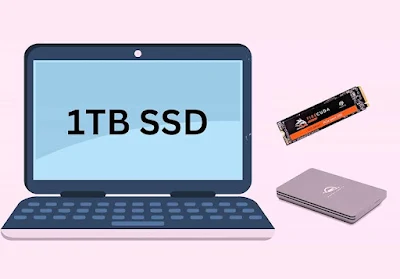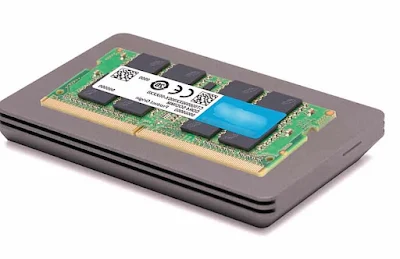Unlocking the Power of 1TB SSDs: A Comprehensive Guide
In the world of data storage, Solid-State Drives (SSDs) have emerged as game-changers, offering remarkable speed, reliability, and durability compared to their traditional Hard Disk Drive (HDD) counterparts. Among the various capacities available, the 1TB SSD stands out as a versatile and high-capacity storage solution. In this comprehensive guide, we'll explore the fascinating world of 1TB SSDs, diving deep into their benefits, how they work, different types, best practices for usage, and much more. Whether you're a tech enthusiast, a professional, or just curious about the future of storage, this guide will equip you with all the knowledge you need.
## Table of Contents
- **What is a 1TB SSD?**
- **How Does a 1TB SSD Work?**
- **Benefits of Using a 1TB SSD**
- **Types of 1TB SSDs**
- **Choosing the Right 1TB SSD**
- **Installation and Migration**
- **Optimizing Your 1TB SSD**
- **Common FAQs About 1TB SSDs**
- **Future Trends in SSD Technology**
- **Conclusion**
### What is a 1TB SSD?
A 1TB SSD, or 1 Terabyte Solid-State Drive, is a storage device that stores data electronically using NAND flash memory. It offers a substantial storage capacity of 1 terabyte, which is equivalent to 1,000 gigabytes or 1,000,000 megabytes. To put this into perspective, it can hold thousands of high-resolution photos, hours of 4K video, and a vast library of applications and games.
### How Does a 1TB SSD Work?
At the heart of a 1TB SSD is NAND flash memory, a non-volatile storage medium that retains data even when the power is turned off. Unlike HDDs, which rely on spinning platters and mechanical read/write heads to access data, SSDs use NAND chips to store and retrieve data electronically. This fundamental difference in technology leads to several key advantages:
**1. No Moving Parts:**
SSDs have no moving parts, making them more durable and less prone to physical damage. This is a significant departure from HDDs, where a sudden drop or impact can lead to data loss.
**2. Speed:**
SSDs offer lightning-fast data access and transfer speeds. This is because there is no physical movement involved in reading or writing data. This speed boost translates into quicker boot times, faster application loading, and improved overall system performance.
**3. Silence:**
HDDs generate noise due to the spinning of their disks and the movement of read/write heads. SSDs operate silently, contributing to a quieter computing environment.
**4. Energy Efficiency:**
SSDs consume less power compared to HDDs. The absence of spinning disks means less energy is required to operate, making them an environmentally friendly choice.
**5. Low Heat Generation:**
SSDs generate minimal heat during operation, reducing the need for extensive cooling systems in laptops and desktops.
### Benefits of Using a 1TB SSD
1TB SSDs offer a wide range of benefits that make them an attractive choice for various applications:
**1. Speed and Performance:**
Perhaps the most significant advantage of a 1TB SSD is its speed. With near-instantaneous data access, your applications load faster, file transfers are swift, and your computing experience becomes remarkably responsive.
**2. Reliability:**
SSDs are more reliable than HDDs due to their lack of moving parts. This means they are less prone to mechanical failures and data loss, ensuring that your data remains safe and accessible.
**3. Energy Efficiency:**
The energy-efficient nature of SSDs not only reduces your carbon footprint but also extends the battery life of laptops and mobile devices, making them ideal for on-the-go use.
**4. Durability:**
SSDs can withstand shocks and vibrations better than HDDs. This makes them suitable for laptops and portable devices that may experience physical jolts during regular use.
**5. High Capacity for Multitasking:**
A 1TB SSD provides ample storage for multitasking, content creation, and storing large media files like high-definition videos and high-resolution photos.
**6. Noise Reduction:**
SSDs operate silently, contributing to a quieter and more comfortable computing environment.
**7. Data Security:**
Many 1TB SSDs come equipped with advanced encryption features that protect your data from unauthorized access. Their durability also ensures that your data remains intact even in challenging conditions.
**8. Future-Proofing Your Storage:**
As technology advances and software becomes more storage-intensive, a 1TB SSD not only meets your current needs but also provides room for future growth, ensuring that your storage solution remains relevant for years to come.
### Types of 1TB SSDs
1TB SSDs come in various types to cater to different needs and budgets:
**1. SATA SSDs:**
These are the most common and affordable type of 1TB SSDs. They use the SATA III interface and offer good performance for everyday computing tasks.
**2. NVMe SSDs:**
NVMe (Non-Volatile Memory Express) SSDs use the PCIe (Peripheral Component Interconnect Express) interface, which is faster than SATA. They are ideal for enthusiasts and professionals who require top-tier performance.
**3. M.2 SSDs:**
M.2 is a form factor for SSDs that is smaller and more compact than traditional 2.5-inch drives. Many 1TB M.2 SSDs are NVMe-based and fit directly onto a motherboard, saving space and enhancing airflow in desktop systems.
**4. External SSDs:**
These 1TB SSDs are enclosed in an external casing and connect to your device via USB or Thunderbolt. They are portable, making them excellent for data backups and on-the-go storage solutions.
**5. Enterprise SSDs:**
Designed for data centers and enterprise environments, these SSDs prioritize reliability, endurance, and data protection. They are typically more expensive and may have features like power loss protection.
Choosing the Right 1TB SSD
When selecting a 1TB SSD, consider the following factors:
**1. Performance:**
If speed is a priority, opt for an NVMe SSD. They offer faster read and write speeds compared to SATA SSDs.
**2. Form Factor:**
Determine whether you need a 2.5-inch drive, an M.2 drive, or an external SSD based on your device and storage requirements.
**3. Endurance:**
For heavy workloads, such as video editing or data analysis, consider SSDs with higher endurance ratings. Enterprise-grade SSDs are an excellent choice for such tasks.
**4. Price:**
While SSD prices have become more competitive, NVMe and M.2 SSDs tend to be more expensive than SATA SSDs. Balance your budget with your performance needs.
**5. Brand and Warranty:**
Choose a reputable brand known for reliability and customer support. Check the warranty terms, as they can vary from one manufacturer to another.
Installation and Migration
Installing a 1TB SSD in your device can be a straightforward process, but it's essential to follow the manufacturer's instructions and take precautions:
**1. Backup Your Data:**
Before starting the installation, make a complete backup of your existing data. This ensures that you won't lose any important files during the process.
**2. Prepare the SSD:**
If your SSD didn't come with cloning software, you can use third-party tools like Macrium Reflect or Samsung Data Migration (for Samsung SSDs) to clone your existing drive to the new SSD.
**3. Physical Installation:**
Depending on your device, physically installing the SSD may involve opening the case or removing a cover. Follow the device-specific instructions and handle components carefully to avoid static discharge or damage.
**4. Boot from the SSD:**
After the installation is complete, make sure your computer boots from the SSD. You may need to access the BIOS or UEFI settings to set the new drive as the primary boot device.
**5. Verify Data:**
Double-check that all your data has been successfully migrated to the SSD. You can do this by opening files and applications to ensure everything works as expected.
Optimizing Your 1TB SSD
To get the most out of your 1TB SSD, consider implementing the following optimization techniques:
**1. Enable TRIM:**
TRIM is a command that helps SSDs maintain performance over time by erasing data blocks that are no longer in use. Most modern operating systems support TRIM, so make sure it's enabled.
**2. Disable Defragmentation:**
SSDs do not require defragmentation like HDDs. In fact, excessive defragmentation can reduce the lifespan of an SSD.
**3. Update Firmware:**
Check for firmware updates from the SSD manufacturer and apply them as needed. Firmware updates may include performance enhancements and bug fixes.
**4. Monitor Health:**
Keep an eye on your SSD's health and performance using manufacturer-provided software or third-party tools. Monitoring can help you detect potential issues early.
**5. Regular Backups:**
Continue to back up your data regularly, even with an SSD. While SSDs are reliable, no storage device is immune to failure.
**6. Space Management:**
Avoid filling your SSD to its maximum capacity. Leaving some free space helps maintain performance and ensures the drive has room for background tasks.
Common FAQs About 1TB SSDs
**Q1. Are 1TB SSDs more reliable than HDDs?**
Yes, 1TB SSDs are generally more reliable than HDDs due to their lack of moving parts. This makes them less prone to mechanical failures, data loss, and damage from physical shocks.
**Q2. Can I use a 1TB SSD as an external drive?**
Yes, many 1TB SSDs come in external enclosures with USB or Thunderbolt connectivity. These are perfect for creating portable, high-speed external storage solutions.
**Q3. Do I need special software to optimize my 1TB SSD?**
Most modern operating systems have built-in support for SSD optimization, including TRIM. However, you may want to install manufacturer-specific software for monitoring and firmware updates.
**Q4. Can I upgrade my existing laptop or desktop with a 1TB SSD?**
Yes, upgrading to a 1TB SSD is a popular and effective way to breathe new life into an older laptop or desktop. It can significantly improve overall performance.
**Q5. What is the lifespan of a 1TB SSD?**
The lifespan of an SSD is typically measured in Terabytes Written (TBW), which varies depending on the drive's quality and intended use. Consumer-grade SSDs often have TBW ratings in the hundreds of terabytes, which should last several years under normal use.
Future Trends in SSD Technology
The world of SSD technology is ever-evolving, and several trends are shaping the future of these storage devices:
**1. Higher Capacities:**
As NAND flash technology advances, we can expect even higher-capacity SSDs, possibly reaching the multi-terabyte range.
**2. Faster Speeds:**
Future SSDs will continue to push the boundaries of speed, with faster read and write speeds becoming the norm.
**3. Improved Durability:**
SSD manufacturers are working on further improving durability, making SSDs even more resistant to wear and tear.
**4. Enhanced Security:**
SSDs with advanced encryption features will become more prevalent, ensuring data security remains a top priority.
**5. Smaller Form Factors:**
Smaller and more compact form factors, like the M.2 drives, will gain popularity, especially in ultrabooks and compact desktop systems.
**6. Enterprise Solutions:**
Enterprise-grade SSDs will continue to evolve to meet the demands of data centers and cloud computing.
Conclusion
The 1TB SSD is a remarkable storage solution that combines speed, reliability, durability, and ample capacity. Whether you're upgrading your laptop, building a high-performance desktop, or looking for an external storage solution, a 1TB SSD offers a winning combination of benefits. Its impact on everyday computing is profound, with faster load times, smoother multitasking, and improved energy efficiency.
As technology continues to advance, SSDs are poised to play an even more prominent role in our digital lives. With higher capacities, faster speeds, and enhanced durability on the horizon, the future of SSDs looks brighter than ever.
Investing in a 1TB SSD is not just an upgrade; it's a transformation of your digital experience. As the saying goes, "Time is money," and with a 1TB SSD, you'll save both. So, whether you're a professional seeking maximum productivity or an enthusiast looking to unlock the full potential of your system, a 1TB SSD is your key to storage excellence.
Make the switch today, and discover the future of storage with a 1TB SSD by your side.
----------




